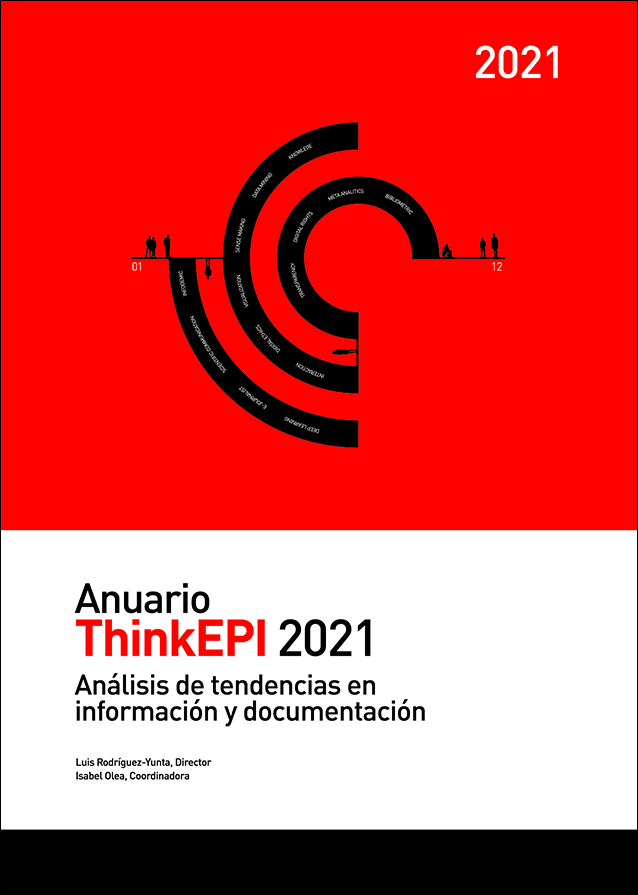"Digital citizenship spaces" in public libraries: a proposal for their inclusion within the framework of the National plan for digital competences
DOI:
https://doi.org/10.3145/thinkepi.2021.e15b02Abstract
The aim of this paper is to describe a feasible way of implementing training and guidance services for empowering learning of digital competences using Spanish public libraries, in accordance with the objectives of the national plan for digital competences. To do so, we outline how new library spaces, which we call "digital citizenship spaces," may be configured and equipped, starting with the expansion of facilities or the renovation of existing ones thanks to the funds provided by the plan. Moreover, we present an initial formulation of the actions and services that would be performed in those spaces, the expected facilities, the material and human resources needed, and the training and support model which should sustain them. We advocate for an integrated model which, from the point of view of complementarity, is: (a) contextualized, aimed at the real needs in the everyday lives of the different target groups, (b) inclusive, paying special attention to the particular needs of groups at risk of digital exclusion, (c) participatory, being developed collaboratively with the recipients, the different government and public administration agents, the private education and technology sectors, the third sector that supports vulnerable groups, and professional associations from the field of documentation and information, and (d) aimed at lifelong learning and the creation of opportunities for social innovation, and artistic and cultural creation in the digital context. The target is to contribute to the development of full digital citizenship, considering the public library as the perfect stage for this.
Downloads
References
Carretero, Stephanie; Vuorikari, Rina; Punie, Yves (2017). The digital competence framework for citizens with eight proficiency levels and examples of use. Publications Office of the European Union. https://doi.org/10.2760/38842
Díez-Palomar, Javier; Flecha-García, Ramón (2010). "Comunidades de aprendizaje: un proyecto de transformación social y educativa". Revista interuniversitaria de formación del profesorado, v. 24, n. 1, pp. 19-30. https://www.redalyc.org/pdf/274/27419180002.pdf
España (2013). "Ley 19/2013, de 9 de diciembre, de transparencia, acceso a la información pública y buen gobierno". BOE, n. 295, 10 diciembre. https://www.boe.es/buscar/act.php?id=BOE-A-2013-12887
Gobierno de España (2020). España puede. Plan de recuperación, transformación y resiliencia. https://www.lamoncloa.gob.es/presidente/actividades/Documents/2020/07102020_PlanRecuperacion.pdf
Gobierno de España (2021). Plan nacional de competencias digitales. https://portal.mineco.gob.es/RecursosNoticia/mineco/prensa/noticias/2021/210127_np_digital.pdf
Gómez-Hernández, José-Antonio; HernaÌndez-Pedreño, Manuel; Romero-SaÌnchez, Eduardo (2017). "Social and digital empowerment of vulnerable library users of the Murcia Regional Library, Spain". Profesional de la información, v. 26, n. 1, pp. 20-32. https://doi.org/10.3145/epi.2017.ene.03
Gómez-Hernández, José-Antonio; Vera-Baceta, Miguel-Ángel (2021). "Las bibliotecas públicas españolas ante los fondos europeos de recuperación y el Plan nacional de competencias digitales". Anuario ThinkEPI, v. 15, e13b03. https://doi.org/10.3145/thinkepi.2021.e15b01
Hernández-Pedreño, Manuel (2008). "Pobreza y exclusión en las sociedades del conocimiento". En: HernaÌndez-Pedreño, Manuel (coord.). Exclusión social y desigualdad. Murcia: Editum. https://www.um.es/documents/1967679/1967852/Libro-Exclusion-social-desigualdad-08.pdf/b3392fe8-ca07-44d4-8833-2a2124a3b190
Jaramillo, Orlanda; Quiroz-Posada, Ruth-Elena (2013). "La educación social dinamizadora de prácticas ciudadanas en la biblioteca pública". Educaí§í£o & sociedade, v. 34, n. 122, pp. 139-154. https://doi.org/10.1590/S0101-73302013000100008
Quijano-Solís, Á. (2012). "Comunidades de práctica, comunidades de aprendizaje y bibliotecas". En: Tarango, Javier; Mendoza-Guillén, Gabriela (eds.). Didáctica básica para la alfabetización informacional. Buenos Aires: Alfagrama Ediciones, pp. 142-158.
Riel, Margaret; Polin, Linda (2004). "Online learning communities". In: Barab, Sasha; Kling, Rob; Gray, James H. (eds.). Designing for virtual communities in the service of learning. Cambridge, MA: Cambridge University Press, pp. 16-50. https://doi.org/10.1017/CBO9780511805080.006
Romero-Sánchez, Eduardo; Gómez-Hernández, José-Antonio; HernaÌndez-Pedreño, Manuel (2018). "A funí§í£o social das bibliotecas públicas: a perspectiva profissional". Revista Ibero-Americana de ciíªncia da informaí§í£o, v. 12, n. 2, pp. 341-360. https://doi.org/10.26512/rici.v12.n2.2019.20642
Sales, Dora (2020). "DefinicioÌn de alfabetizacioÌn informacional de Cilip, 2018". Anales de documentacioÌn, v. 23, n. 1. https://doi.org/10.6018/analesdoc.373811
Sánchez-García, Sandra; Yubero, Santiago (2015). "Función social de las bibliotecas públicas: nuevos espacios de aprendizaje y de inserción social". Profesional de la información, v. 24, n. 2, pp. 103-111. https://doi.org/10.3145/epi.2015.mar.03
Yubero, Santiago (2004). "Socialización y aprendizaje social". En Páez-Rovira, Darío; Fernández-Sedano, Itziar; Ubillos-Landa, Silvia; Zubieta, Elena-Mercedes (coord.). Psicología social, cultura y educación. Madrid: Pearson Educación, pp. 819-844. https://www.ehu.eus/documents/1463215/1504276/Capitulo+XXIV.pdf
Downloads
Published
How to Cite
Dimensions


